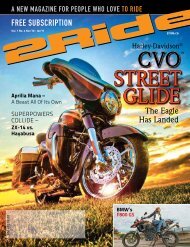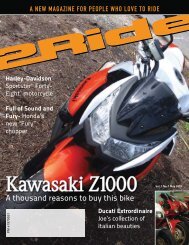NORTON Commando 961 - 2ride.ca Motorcycle Magazine
NORTON Commando 961 - 2ride.ca Motorcycle Magazine
NORTON Commando 961 - 2ride.ca Motorcycle Magazine
Create successful ePaper yourself
Turn your PDF publications into a flip-book with our unique Google optimized e-Paper software.
this was no accident and nor is<br />
any collision on our roadways.<br />
It’s time people start <strong>ca</strong>lling<br />
things what they really are. this<br />
was a ‘crash’ or a ‘collision’. not an accident.<br />
What’s the difference you ask? an<br />
‘accident’ is something that is unavoidable<br />
and unforeseen. Collisions or crashes aRe<br />
predictable and therefore avoidable.<br />
When we go out on our roads, there<br />
is always a chance of being involved in<br />
a crash. Lets face it…it happens several<br />
times a day. although…if they happen<br />
everyday, they are predictable. so how<br />
do you avoid them? Well for starters pay<br />
attention to your surroundings and road<br />
conditions. By keeping a <strong>ca</strong>reful watch on<br />
the vehicles around you, you are more able<br />
to spot certain behaviours that may lead to<br />
trouble. It only takes one person to not pay<br />
attention to create the conditions for a collision.<br />
However, it only takes one person<br />
who is paying attention to recognise those<br />
developing conditions and avoid them entirely.<br />
It’s a simple thing <strong>ca</strong>lled ‘situational<br />
awareness’ but it’s something that is sorely<br />
lacking on our roads - especially among <strong>ca</strong>r<br />
drivers. the most attentive road users are<br />
motorcyclists and professional truck drivers.<br />
Both know full well that they must be<br />
well aware of everything going on around<br />
them and plan well ahead while navigating<br />
NoT an Accident<br />
stORY BY sHAuN De JAGeR- FOuNDeR OF ROAD AWAReNess<br />
pHOtOGRApH COuRtesY OF tIM BuRROWs<br />
our dangerous roadways.<br />
so what’s wrong with the term ‘accident’?<br />
We’ve been <strong>ca</strong>lling it that for<br />
de<strong>ca</strong>de’s right? Yes we have but it’s the<br />
wrong term to use be<strong>ca</strong>use every crash on<br />
our roads is in fact avoidable and there is<br />
always someone responsible for it. Crashes<br />
as a result of drinking and driving are<br />
avoidable. Crashes that are a result of<br />
<strong>ca</strong>reless or distracted driving are avoidable.<br />
even crashes that occur be<strong>ca</strong>use of<br />
mechani<strong>ca</strong>l failures are avoidable (check<br />
your tire pressures, brakes, etc. basi<strong>ca</strong>lly<br />
make sure that your vehicle is mechani<strong>ca</strong>lly<br />
sound and your wheels won’t fall off).<br />
My biggest issue with the term ‘accident’<br />
is that it seems to absolve a person’s sense<br />
of accountability for what happened – even<br />
when deemed at fault. a fellow tells his<br />
friend “Oh I had an accident yesterday”<br />
and his friend replies “It’s ok…it was an<br />
accident. You couldn’t avoid it. It happens<br />
so don’t worry about it.” this is such<br />
a poor attitude to take. Yes you probably<br />
could have avoided it had you paid more<br />
attention to your surroundings. Why are<br />
collisions acceptable? they shouldn’t be<br />
acceptable at all but we blow them off<br />
be<strong>ca</strong>use we <strong>ca</strong>ll them accidents – it was<br />
unavoidable. I didn’t do anything wrong!<br />
Maybe…but there’s always more that you<br />
could have done ‘right’ to have avoided<br />
it altogether.<br />
“the guy ran a red light and t-Boned<br />
me!” sure…ok…but you were making a<br />
left hand turn, so it’s your responsibility<br />
to ensure that you <strong>ca</strong>n make that turn<br />
safely. It’s not the red light that stops a<br />
<strong>ca</strong>r at an intersection; it’s the driver of<br />
the <strong>ca</strong>r approaching it. You are assuming<br />
that other driver is paying attention to the<br />
lights. You are ultimately responsible for<br />
what happens to you on our roads. If that<br />
<strong>ca</strong>r approaching the red light isn’t slowing<br />
down fast enough…assume that he won’t<br />
stop at all. If you don’t have a clear view of<br />
on-coming traffic…don’t risk making that<br />
turn until you do.<br />
this is just one example but I could go<br />
on and on with other situations that could<br />
result in a collision and how to avoid them<br />
just by paying more attention and making<br />
alternate assumptions. If I <strong>ca</strong>n – so <strong>ca</strong>n<br />
you. therefore crashes on our roads are<br />
nOt accidents – they are avoidable. there<br />
is almost always a shared responsibility<br />
for what happens regardless of who is<br />
found at fault by either the police or your<br />
insurance company.<br />
If you want to reduce your chance of<br />
being in a ‘collision’, pay more attention to<br />
your surroundings and road conditions and<br />
get some advanced driver training. those<br />
added skills could save your life.<br />
What are you thinking?<br />
By SID RoChWERG<br />
We’ve all heard how most accidents<br />
happen close to home. It’s been written<br />
that 1/3 of all accidents occur within a<br />
kilometer of your home. If you think<br />
about it, it’s not surprising since you<br />
would travel on your own street and<br />
neighborhood more than any other.<br />
As I reflected on this common statistic<br />
it really led me to the subject of this<br />
article. What are you thinking about<br />
when riding? When you get closer to<br />
home what are your thoughts? I find<br />
when I get close to home my mind sees<br />
myself already walking in the door,<br />
planning what I’m going to do next,<br />
heading to the computer to check email.<br />
Wait…I’m still on my motorcycle, I’m<br />
not home yet! I still need to be focused<br />
on my riding and watching out for other<br />
drivers and hazards along my path.<br />
What are you thinking about when<br />
you’re riding? What are your thoughts<br />
focused on when you’re riding? are<br />
you thinking about the road ahead, the<br />
driver turning left with the sun in their<br />
eyes, the right turn with the obstructed<br />
view, the kids kicking the ball on the<br />
lawn?<br />
do you ride to work every day when<br />
the weather permits? For office workers<br />
business <strong>ca</strong>sual dress and jeans days on<br />
Fridays or over the summer has made<br />
it easier to ride to work in proper safer<br />
clothing without the hassle of changing<br />
attire upon arrival.<br />
Is it really safe or smart to ride to work<br />
every day?<br />
If I rode to work all the time, riding<br />
would no longer be special. and if it’s<br />
not special then it is routine. and if it<br />
is routine then I am not as focused on<br />
my riding as I should be. When on my<br />
motorcycle would I be thinking about<br />
work, rushing to a meeting, reviewing<br />
in my head the strategy for a criti<strong>ca</strong>l<br />
situation? When riding back home<br />
would I be rushing? Would I be thinking<br />
about that last hallway conversation<br />
rather than focusing on my riding?<br />
every time I ride my motorcycle is<br />
special. It’s exactly where I want to be at<br />
that moment in time. I want my riding to<br />
have my full attention and respect. this<br />
kind of concentration is not always easy.<br />
With our compli<strong>ca</strong>ted lives distractions<br />
are everywhere. so, to ride safely we<br />
must minimize the distractions so we<br />
<strong>ca</strong>n stay focused on what we are doing.<br />
should a heavy equipment operator<br />
be distracted? How about a lone pilot<br />
or explosives expert? I hope you get<br />
the idea. distractions are great when<br />
you’re bored. they’re deadly when<br />
you’re performing a task that needs your<br />
undivided attention.<br />
the most dangerous distraction,<br />
however, is you. Letting your mind<br />
wander creates the distraction. When<br />
we start to focus on the problems<br />
at work or at home the anxiety will<br />
change our behavior immediately.<br />
You might find yourself hurrying<br />
home or becoming a participant in<br />
road rage. I appreciate that some may<br />
have purchased a motorcycle not for<br />
recreation but for basic transportation<br />
or perhaps both. and I’m really not<br />
suggesting that you don’t ride everyday<br />
if given the opportunity. What I am<br />
saying is to check where your head is at.<br />
When you hit that starter button and get<br />
the thrill of the motor firing up, make<br />
sure you’ve parked your distractions<br />
away. So, just figuratively roll them into<br />
a ball and put them in your knap sack<br />
or saddle bag before riding away. When<br />
you get home you <strong>ca</strong>n take them out<br />
again and deal with them.<br />
I once attended a seminar where, at<br />
the start, they had everyone write down<br />
on a piece of paper what was currently<br />
on their minds and perhaps distracting<br />
them. then we were asked to fold up<br />
the paper and tape it on a flip chart at<br />
the front of the room within a diagram<br />
What are you doing this weekend?<br />
Try M2 and M licence training with free STREET PROOFING!<br />
Toronto • Sene<strong>ca</strong> College • Windsor • North Bay • Sudbury • College Boreal • Timmins<br />
Kirkland Lake • Northern College • Pembroke • Algonquin College • Kapuskasing • Sarnia<br />
New Liskeard • Arnprior www.learningcurves.<strong>ca</strong> 1.877.466.9931 or 416.466.9931<br />
sept/OCt 2010 [58] sept/OCt 2010 [59]<br />
(cont’d)





